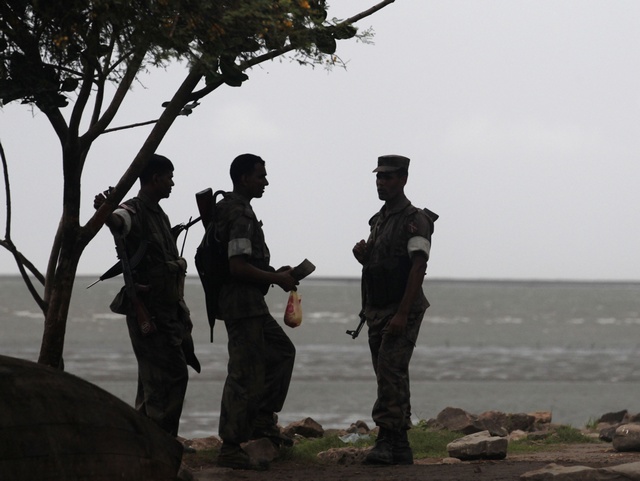As Burma’s army was stepping up an anti-insurgency operation in the country’s northwest in October, senior officers cancelled talks with their Bangladeshi counterparts, straining ties with a key potential ally in dealing with the violence on their border.
The cancelled meetings, revealed in documents seen by Reuters, are the latest on a long list of failed initiatives to improve relations between fractious neighbours who both see the largely stateless Muslim Rohingya at the heart of the crisis as the other nation’s problem.
Bangladeshi diplomats say the abrupt cancellation of the talks, planned for mid-October, reflected Burma’s reluctance to deepen bilateral ties and press ahead with talks on security cooperation and the establishment of border liaison officers.
“Those two documents are incredibly important, particularly given the situation we’re dealing with right now, but we’ve hit a wall,” said a senior Bangladeshi official, who did not want to be identified because of the private nature of the exchanges.
Burmese officials did not comment on the meetings.
Defusing the deep-seated mistrust between the two countries is crucial both to improving the plight of the Rohingya minority and curbing the insurgency Burma’s government says it is fighting in the northwest, diplomats and analysts say.
Close to 27,000 people have fled across the border from Arakan State to Bangladesh since 1 November, according to the United Nations Office for the Coordination of Humanitarian Affairs, with more people likely to have fled since the onset of violence in October.
The Rohingya, of whom there are around 1.1 million in Arakan State, are denied citizenship by Burma and Bangladesh, who both cite census documents and historical accounts to argue they have a long-established presence in the other country.
Growing isolation
The cancelled meetings also point to the growing isolation of the eight-month-old administration of Nobel Peace Prize winner Aung San Suu Kyi, facing criticism of her handling of the crisis from both Western nations and Asian countries such as Malaysia.
Burma’s military and the government have rejected allegations by residents and rights groups that soldiers have raped Rohingya women, burnt houses and killed civilians during the military operation in Arakan State.
“Regarding the Army to Army Talk between Bangladesh Armed Forces and Myanmar Defence Services … I deeply regret to inform you that our authorities would like to postpone,” said the head of the Burma military’s foreign relations department, Lieutenant Colonel Aung Zaw Linn, in a letter to Bangladeshi officials on 13 October.
The military cited “unforeseen commitments” as a reason to cancel the nearly week-long talks scheduled in Bangladesh from 16 October.
The letter was sent four days after nine Burmese police officers were killed in attacks on border posts. Since then, security forces have flooded northern Arakan State, hunting a Rohingya insurgent group the government says was responsible.
Five days later, the head of the Burma police division against transnational crime also pulled out of talks with the Bangladeshi border guard force planned for 25-27 October in Dhaka, citing the security situation in Arakan State.
One of the documents Bangladeshis were keen to discuss was a memorandum of understanding on security dialogue and cooperation. Another document, reviewed by Reuters, would set up border liaison officers (BLO) on both sides of the frontier and other collaboration measures including joint patrols.
Underscoring deterioration of the ties, Bangladeshi diplomats said last month they pulled out of bilateral foreign ministry consultations seen as a preparatory step before a meeting of heads of state.
“We went everywhere and met with everyone, but we have been met with delays and lack of interest,” said the senior Bangladeshi official.
Bangladesh is the only neighbouring country Suu Kyi, who serves as Burma’s foreign minister as well as being the de facto leader of the government, has not yet visited.
The Burma military’s press office and presidential spokesman Zaw Htay did not respond to an emailed request for comment.
Aye Aye Soe, an official at the Ministry of Foreign Affairs, said there had been an “earlier meeting” between the two militaries on the “current refugees issue but [that] also involved other border related issues — drug trafficking and other transorganised crimes.” She said she had no other details.
Bangladesh Army spokesman Colonel Rashidul Hasan said he could not comment because he was not aware of the meeting. Gowher Rizvi, an external affairs advisor to Prime Minister Sheikh Hasina, declined to comment.
Diplomatic reprimand
Tensions between the two countries were exacerbated last month, when Burma’s envoy in Dhaka was reprimanded over reports in state media that some of the insurgents blamed for the 9 October attacks had crossed the border from Bangladesh.
The violence in Arakan State is the biggest crisis faced by Suu Kyi’s government, threatening her No. 1 goal of ending years of ethnic war. Insurgencies dogged Burma through decades of military rule, and fighting has also recently flared near the border with China.
Rohingya activists claim a centuries-old lineage in Arakan State, which like the rest of Burma is predominantly Buddhist. Burma sees the Rohingya as illegal immigrants from Bangladesh.
Predominantly Muslim Bangladesh disowns the Rohingya and has refused to grant them refugee status since 1992.
The United Nations’ refugee agency supports more than 32,000 registered Rohingya in official camps in the east of Bangladesh, and estimates up to 500,000 undocumented Rohingya live in the country.
The population has grown since 2012, when communal clashes between ethnic Arakanese Buddhists and Rohingya killed more than 100 people and displaced tens of thousands.
[related]
Richard Horsey, a former UN diplomat in Burma, said relations with Bangladesh had always been characterised by “deep tension and suspicion,” adding that Burma was missing an opportunity by not seeking more help from Dhaka in the wake of the 9 October attacks.
“The Bangladeshi side has cooperated in the early stages,” he said. “And, given their track record of investigating radical organisations, it is somewhat surprising Myanmar has seemingly not reached out more openly about cooperation on the attacks.”



